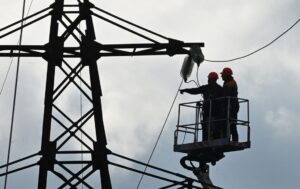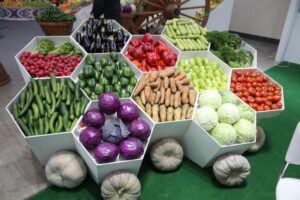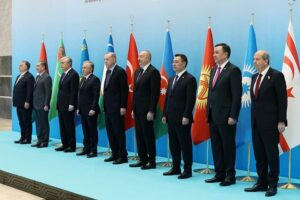
Significant consumer outages are taking place in eight regions in western and southern Ukraine as a result of bad weather (stormy wind and snow and rain), which caused damage to distribution system operators’ (DSO) networks, the NEC Ukrenergo said.
According to its update in the Telegram channel, these are the Volyn, Lviv, Zakarpattya, Rivne, Khmelnytskyi, Ternopil, Chernivtsi and Odessa regions.
The company noted that repair teams of distribution system operators (DSOs) are working to repair the damage and restore power supply.
In addition, consumption restrictions are applied in Zhytomyr region due to significant damage to the networks as a result of repeated attacks of the Russians. The situation with power supply along the front line also remains difficult, where, in particular, on Monday, Russian shelling damaged the OSR networks in Kharkiv, Zaporizhzhia and Kherson regions.
In general, the power system due to lower temperatures consumption is slightly higher than on Monday, nevertheless, the production of electricity is enough to cover it, confirmed the NEC.
Also, Ukrenergo reported the completion of Tuesday’s emergency work and the connection of 5 pieces of critical equipment at various sites on its backbone networks.
“This allowed to eliminate some grid limitations and increase the reliability of power supply in certain regions,” the NEC said in a statement.
At the same time, the company noted that such work in peacetime would have involved the reconstruction of several substations and would have lasted several months. The company thanked its Lithuanian colleagues for providing part of the equipment for the restoration.
As previously reported, the Ministry of Energy also reported about power outages on Tuesday due to bad weather in the western regions of the country.

Ukrainian agrarians in 2023 plan to increase sown areas under onions, carrots and other vegetables, which will allow for a larger than in 2022 harvest, First Deputy Minister of Agrarian Policy and Food Taras Vysotsky said.
“The Ministry of Agricultural Policy and Food is working to fill the market and stabilize prices. This should be done not through regulation or limitation but through market mechanisms. Because regulation of prices, as practice shows, is realized in the shadow turnover,” – said the official on the air of the marathon “Unified News”.
Speaking about the current prices of vegetables, Vysotsky said that the prices of vegetables are the highest in spring, which is explained by the seasonal factor.
In addition, according to him, their cost was affected by two other factors. “First, the energy crisis created by the aggressor country prevented a large part of the harvest from being saved. Second, many vegetables, primarily onions and carrots, were grown in the Kherson and Zaporozhye regions. Because of the occupation of these regions, vegetables were not available to Ukrainian consumers,” Vysotsky said and expressed confidence that prices would go down with the arrival of the new crop.
According to Gosstat, prices for vegetables in Ukraine for the year to the beginning of March rose by 36.2%, fruit – by 74.9%, while inflation was 24.9%.

Oil prices of benchmark grades are declining in trading on Tuesday after reaching their highest levels in the last two weeks a day earlier.
At 8:01 a.m., May futures for Brent at ICE Futures Exchange in London stood at $77.8 per barrel, down $0.32 (0.4%) from the previous session’s close. Those contracts rose by $3.13 (4.2%) to $78.12 per barrel at Monday’s trading.
WTI futures for May at electronic trades of NYMEX decreased by $0.04, to $72.77 per barrel. Contracts rose $3.55 (5.1%) to $72.81 a barrel in the previous session.
“The crystal ball, which was clouded by the banking crisis, now shows an opportunity for profit in the oil market,” believes Manish Raj, managing director of Velandera Energy Partners. According to him, “After the disorderly sell-off in mid-March, cooler thinking has begun to prevail as traders see falling oil prices as a good entry point into the market,” MarketWatch reports.
However, analysts continue to fear the possibility of a recession in the U.S. economy, which is weighing on the market, Trading Economics reported.

In 2023-2028, Uzbekistan will implement a project to create a value chain in the fruit and vegetable industry with the participation of the Japan International Cooperation Agency (JICA).
The total cost of the project is $323 million, including:
– a loan from the Japan International Cooperation Agency (JICA) – $200 million;
– the contribution of the Republic of Uzbekistan to the Project in the form of value added tax coverage and customs duty exemptions – $58.3 million;
– contribution of Project participants (loan recipients – Project initiators) – $64.8 million.
The project is being implemented in all regions of Uzbekistan, and its implementation period is 6 years – from 2023 to 2028.
The International Center for Strategic Development and Research in Food and Agriculture under the Ministry of Agriculture of Uzbekistan has been appointed as the executive body responsible for the timely and complete implementation, coordination and management of the project.

Following the summit of the Organization of Turkic States, the leaders of the member states of the organization decided to establish a Turkic Investment Fund with a capital of $500 million.
The creation of the Turkic Investment Fund will help to solve a whole range of tasks related to the development of the organization’s members. In particular, it is expected that its funds will be used to develop intra-regional trade, finance small and medium-sized business projects, support the expansion of transport and logistics chains, promote the creation and modernization of physical and digital infrastructure, and support development projects in areas of mutual interest, including industrial production, infrastructure, transport, agriculture, information and communication technologies, green economy, and tourism.
The fund will have a president, a board of governors, a board of directors, a CEO, and staff. The President will be appointed by the Board of Governors on a rotating basis for a four-year term without extension or reappointment. The Fund will be headquartered in Istanbul.
The Turkic Investment Fund will operate for 20 years from the date of its inaugural meeting. The Board of Governors may decide to terminate or extend the term of the Fund at any time. In addition, the Board of Governors is authorized to periodically review the adequacy of resources and may decide to make additional contributions.
The Fund will have the status of an international financial organization.